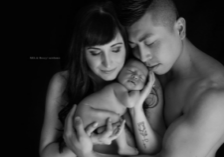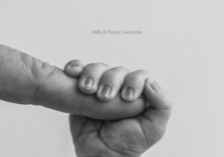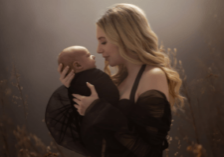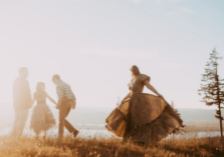Niche Down, Scale Up: Diversifying Your Income Without Limiting Your Creativity with Hope Taylor
Should you niche down or generalize? There’s a lot of pressure for photographers to choose one area of interest. But just because you’ve found your passion doesn’t mean you can’t be multipassionate! It’s totally possible (and honestly, preferable) to diversify your income, build up your passive income streams and create a well-rounded business.
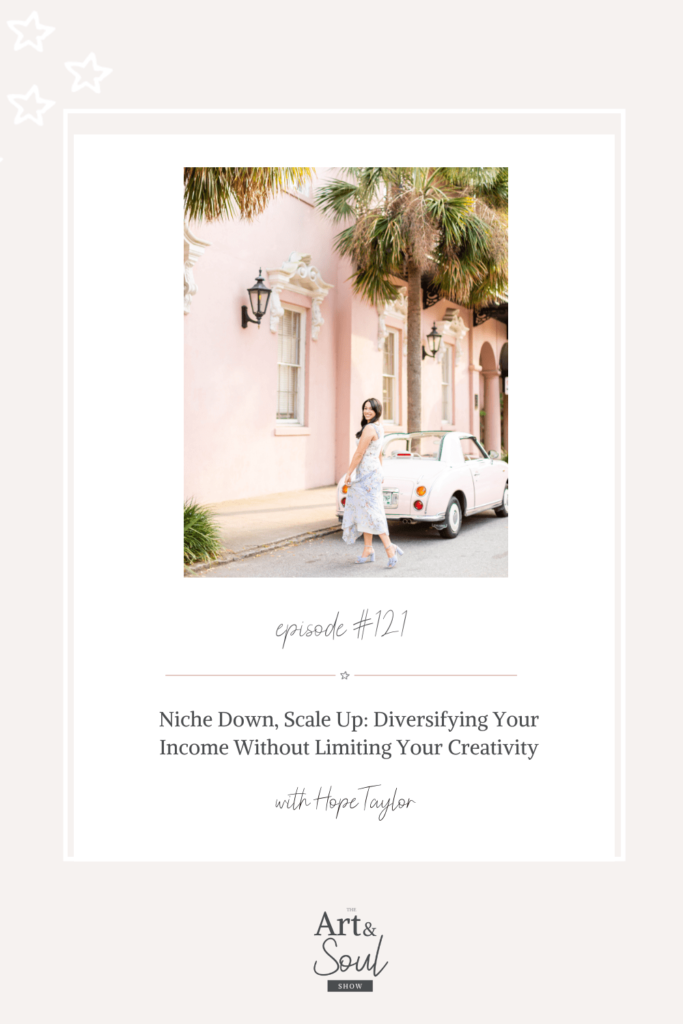
In this episode, I’m chatting with coach and photographer Hope Taylor about how to niche down and build out your passive income potential without limiting yourself.
Hope is sharing how she found her passion for senior and wedding photography. Then, she’s explaining how she diversified her income streams through coaching and passive income. We’re also talking about showing up online and how to build your personal brand.
What’s in this episode:
- How Hope found her passion for photography, business, and passive income [2:21]
- How she found her passion for senior and wedding photography [4:23]
- How to start niching down and learn to say “no” to work you don’t want [6:38]
- Why your branding should be an extension of your natural personality and style [8:43]
- Hope’s experience moving her business to another state – twice! [12:04]
- How to get comfortable on the other side of the camera and start building your personal brand [15:34]
- Hope’s journey to offering high-level mastermind coaching [19:59]
- How you can use outsourcing to help you stay in your zone of genius [23:30]
- Hope’s advice for seasoned and new business owners [29:02]
If you want to learn to diversify your income streams and start generating passive income to create more freedom in your business, tune in to this episode.
SUBSCRIBE: iTunes | Spotify | Stitcher
Meet Hope Taylor
Hope is a senior portrait and wedding photographer serving both Charleston and Savannah. She began her business at only 16 years old and now, almost 10 years later, she leads other photographers to help them build businesses that they are proud of.
Connect with Hope
Subscribe to her Youtube channel
Did you love hearing about how to create new passive income streams from Hope? Check out another episode with Paulina Duczman
Transcript:
[00:00:00] Hope Taylor: Another big piece of advice I can give is that if you don’t see somebody else doing the thing that you’re doing, you are exactly where you are supposed to be and leaning into what makes you unique and what you love is the best thing you can do for yourself. And that sounds so cliche, and there’s probably somebody listening that just rolled their eyes while driving on the highway. But it’s just so true. And I still catch myself sometimes having a gut feeling that something is right for my business and I chicken out because I don’t see anyone else doing it. So here’s a little bit more permission from Hope to lean into the things that make you unique and that are different from what you see other people doing. So that’s a good thing.
[00:00:41] Lisa DiGeso: Welcome to the Art and Soul Show, where we dove into heart opening chats on photography, business, life and that messy in between. I’m your host, Lisa DiGeso, a mom, a photographer and entrepreneur. And I’ll be sharing honest conversations and advice for photographers with insight on mindset, entrepreneurship and creativity. The goal of this podcast is for you to be able to gain insights and strategies that will get you real results. Because, let’s face it, having a photography business can be lonely, but it doesn’t have to be. This is the place you can go when you need a boost of encouragement, a kick in the pants and inspiration to pick up your camera. This is the Art and Soul Show. Hello, my lovely friends. Welcome back to the show. I am so excited to dove in today. Today I’m hanging out with Hope Taylor. Now, Hope Taylor is a senior portrait and wedding photographer serving both Charleston and Savannah. And she began her business at only 16 years old. And now, almost ten years later, she leads other photographers to help them build businesses that they are proud of. She specializes in marketing, business, passive income and senior photography. So I’m so excited to dive into our conversation today. I first found her, I think actually on an ad on Instagram and then started following her, following her YouTube channel that has so much incredible juicy info. You can tell she really, really cares about her students and the impact that she’s making on their businesses and lives. So without further ado, welcome.
[00:02:15] Hope Taylor: Thank you so much for having me, Lisa. I am so excited to be here and I’m looking forward to all the things we’re going to shout about today.
[00:02:21] Lisa DiGeso: Love it. So tell us who you are and what you’re passionate about. Yeah.
[00:02:26] Hope Taylor: So like you mentioned, I am a photographer. I photograph both high school seniors and weddings. So passionate about those things on the obvious front. But I’m also very passionate about simplifying business and creating passive income through automated systems that allow you to get a little bit of your life back. And I’m also super passionate about mental health. I’ve struggled with anxiety my entire life. So love. Yes, yes. I hear this from so many creatives and so many business owners. So I kind of love sharing and talking through what work life balance looks like as somebody with anxiety and how to find just your happy place among all of those things.
[00:03:04] Lisa DiGeso: I love that and it’s like, I’ve been doing this for 12 years. You’ve been running your business for ten. I can’t believe you started at 16. No, that’s amazing and incredible. And I love that so much. Now, you touched a little bit about passive income, and for maybe our listeners that don’t know what passive income is, can you maybe share with us how you define it?
[00:03:24] Hope Taylor: Yeah, absolutely. So to me, passive income is essentially a form of income or a product or a service that you can do one time and that doesn’t have a cap on how much money you can make. So essentially anything that you sell that isn’t directly exchanging your time for money. And I think that if a lot of service based business owners are listening and then they don’t, I remember when I just didn’t even know what that meant. Like, I didn’t know what life could look like if I wasn’t just exchanging time for money. So it’s essentially a stream of income. That doesn’t mean you’re exchanging time for money.
[00:03:56] Lisa DiGeso: I love that. And I think because we, I mean, we’ve been in the course creation industry and doing online retreats for a number of years. So are you helping your students sort of get into their own way of creating their online passive income experiences for their students?
[00:04:11] Hope Taylor: Yes. So right now, the only capacity that I teach that is in my really high level mastermind, I work with business owners for six months at a time and I help them do just that, create and scale and automate a digital product.
[00:04:23] Lisa DiGeso: Love it. So I love that you specialize in senior photography and wedding photography. Now, how did you discover these as your niches?
[00:04:32] Hope Taylor: So this is a perfect segue way because you mentioned that I started my business at 16 and that is how I got started with senior portraits. Kind of the natural thing for me to get started with was photographing my peers and their senior portraits before graduating. So in my junior and senior year of high school, that’s what I was doing full time. I was terrified of weddings. They scared the ever living daylights out of me and I didn’t want to touch them with a ten foot pole until I was really comfortable photographing them. So I spent about two years doing primarily seniors, but a little bit of everything. And then I moved into wedding photography as I got older and as I graduated.
[00:05:08] Lisa DiGeso: I love that. Now, do you find you’re like, are you thinking because you’re 26 now? I started my photography business, I think, when I was 30 and I had just had my son, so I was a new mama. So do you see yourself progressing into other genres or are these like your loves and you’re going to stick there?
[00:05:27] Hope Taylor: Oh, I love this. So I’ve actually found I recently got engaged and so I have found that through that season of my life, I have loved photographing engagements and weddings even more, just like you’re mentioning as a new mom. Like you’re going to love photographing families with babies. So that’s been really fun for me. But I do think that those will remain my two love senior portraits, even though I am now far removed from high school, are still just my number one love. And so I think that they’ll stay my true loves, but I can totally see myself wanting to photograph like maternity and baby and things like that for friends as they move into that season of life. It’s so funny how that’s so closely linked to your creativity.
[00:06:03] Lisa DiGeso: It really is. My little guy, my son’s now 12 and like so he’s kind of I come out of that now, he just doesn’t want to be photographed at all. And so I went through a really hard time where I was like, I’ve lost my muse. I don’t know what’s giving me my sparkle. And so over the past six months to a year, I’ve actually decided to take a little bit of time, take a little sabbatical from my photography business, focus on my online, the podcast, all that kind of stuff, and kind of really get back to my roots. And what I’m really discovering is my first love really was maternity and newborn, and I will be going back to niching to do that. So my, my, actually, my question is, what advice do you have for someone who may be doing all the things currently weddings, maternity, newborn, family events and they really do want to start niching down. So what beginning steps do you think are the most important?
[00:06:50] Hope Taylor: So I think the biggest fear that comes along with this thought process is okay, but I don’t want to turn down money, right? Like I’m in the business. I don’t want to get an increase for a family that’s willing to pay me $500 and tell them, no, thank you, I don’t need your $500. And I think that’s honestly a common misconception about me showing down in your business, because I think the first step in the primary step is to start showing only what it is that you want to shoot. But my caveat to that, because I think that’s common advice, right, is if you want to shoot families, only show families. But the caveat to that is to give yourself permission to still accept other types of bookings on the back end of your business while you move into only specializing in that one niche. Because I think that there’s this thought process that if we want to shoot seniors, we have to hard stop, stop shooting everything else right now and only shoot seniors. But the freedom and the beautiful thing is that when you are an entrepreneur and you run your life and you run your business, you get to make the decisions. And nobody else has to know that. You are photographing ten families a week to pay the bills while you’re on your journey to specializing in seniors or in families. And so I think that is my biggest piece of advice, is start showing only what you want to shoot. But keep in mind that that doesn’t have to be a hard stop to turning away other income and other types of photography on the back end. You get to choose and be in control there.
[00:08:13] Lisa DiGeso: That’s great advice I think because it’s almost like that. It’s like a business diet or like a niche diet where you’re just like, okay, well, no more, no more families. And then you’re like, Oh, but I want to maybe do this one, but I don’t want anyone to know that I did this one. So.
[00:08:28] Hope Taylor: You know, that’s a good comparison. It’s so true. And that’s the biggest thing I hear from people is but I really don’t want to have to say no. And so here’s permission. You don’t have to say no. You can be a slow drip in a slow move into that specialization. But I think that it is an important step.
[00:08:43] Lisa DiGeso: Yeah, yeah, I love that. So what I love about your YouTube channel, your social media and your website is you are rock solid on your branding. You have a beautiful, prestigious, cohesive look across all your platforms. So why did based you have her someone maybe just starting out or maybe wanting to upgrade or even overhaul their current business branding.
[00:09:04] Hope Taylor: So I feel like I could talk about this for hours. I love it. I love branding. Thank you for your commitment. That was so sweet. So my biggest piece of advice and the thing that I believe helped my business to stand out and grow as quickly as it did in those early seasons is that I really made my branding an extension of my own personality and my own likes and style, so that it was a very natural thing for me to incorporate into everything that I shared. You mentioned that it’s. Cohesive across all my platforms. And that’s honestly because my brand is just a representation of who I am. It’s my favorite color. It’s my style, it’s my everything that I would normally do in my day to day. So when I’m posting Instagram stories from my house, it’s the same colors as my website because they’re just my favorite colors. And I don’t necessarily think that means every single person has to have such a personal brand that they share to the extent that I do online. But I do think there’s a lot of value in having a brand that’s an extension of your own likes and your own preferences, because naturally there’ll be a lot more cohesion there, and it does help everything to feel a little bit more luxurious and elevated. And I think that it is one of the things that’s helped me grow so quickly is that it just all is cohesive because I love the pastels and I.
[00:10:18] Lisa DiGeso: Love all those things. I love that we’re so similar because I may be the blond thing and we were laughing before we even got on the call. I was like, Oh, my goodness, could you give me my sister? It’s so true. It’s so true. But I’m like, my colors are pinks and whites and laces and what I really struggled with because, you know, you inadvertently compare and you say you go on and you see all these like really boho and earthy. And I’m just like, I’m not boho earthy. I’m like pink and lace.
[00:10:45] Hope Taylor: Yes, yes, absolutely. And I think along that line, another big piece of advice I could give is that if you don’t see somebody else doing the thing that you’re doing, you are exactly where you are supposed to be. And leaning into what makes you unique and what you love is the best thing that you can do for yourself. And that sounds so cliche, and there’s probably somebody listening that just rolled their eyes while driving down the highway. But it’s just so true. And I still catch myself sometimes having a gut feeling that something is right for my business and I chicken out because I don’t see anyone else doing it. So here’s a little bit more permission from Hope to lean into the things that make you unique and that are different from what you see other people doing. That’s a good thing.
[00:11:26] Lisa DiGeso: I love that. It’s such good advice because a lot of the time it’s like you have to see someone doing it to know what’s actually possible, right? And you know, it’s like I think it was like with Roger Bannister and like the four minute mile or whatever, I’m going to butcher that story. But it was just like you need to see somebody that has actually walked it to know that you could do it, you could even do it faster, better, like your own way. And I just think that’s something that we really need to dial into our own unique things because that’s why our clients love us. It’s not just the pretty pictures, it’s the experience and everything that’s rolled into it.
[00:12:03] Hope Taylor: Absolutely.
[00:12:04] Lisa DiGeso: You recently had a bit of a move. Now, did you move your whole business and how far was that?
[00:12:10] Hope Taylor: So I actually recently had to move, so I built my entire business in the Northern Virginia area for the first 7 to 8 years. And then I moved everything to Charleston, South Carolina, with my entire family in 2019 and then a year later started dating Hayden and we got engaged in 2021. So I just moved again to Savannah. So the move from Virginia to Charleston was about 8 hours. The move from Charleston to Savannah was another two and a half. So I did uproot things twice. But the beautiful thing about my business, which kind of brings the whole passive income, digital marketing conversation full circle, is that at this point I would say about 25% of my income is from actual services that I provide, actual photography. The remainder is digital, it’s online, I can work from anywhere, which was an amazing transition for my business before I even knew that I was going to move. That created the freedom for me to be able to do that. So there really wasn’t a huge difference in the service fee side of my business. I did have to market myself and integrate myself into a new market, but not in the way that some other people might be thinking if they followed me online.
[00:13:18] Lisa DiGeso: I love that. Now, did you find that you actually like restarted your entire business, like in the new locations and like, how did that go?
[00:13:26] Hope Taylor: Yeah, so I wouldn’t say that I restarted necessarily because I do have such a large following of people outside of my geographic location since I do teaching and I, all of those things kind of lend themselves to me having a following that wasn’t necessarily related to where I was living. But with that said, I did want to get integrated really quickly and the new market by networking with other vendors and creating those connections in the creative space in both Charleston and Savannah. So the biggest thing that I did when I moved is that I was very strategic and intentional about going out and creating content on my day to day of what I was naturally doing while exploring my new city. So if I was going to a coffee shop, I would snap iPhone photos and videos of the coffee shop and the things that I ordered and my outfit that day. And if I was shopping at a local boutique, I was posting videos of all of the things that I bought, and that’s a very natural thing for me to do because I market very personally anyway. But my goal was I wanted to tag all of these local small businesses and get reposted on their accounts to get in front of the local audiences that they had built. Create connections with those businesses and get the ball rolling from there. So that is really how I got integrated so quickly, both in the Charleston and Savannah market. And it’s something that I’m still doing in Savannah because I just moved here about five, six months ago. But it’s just a really natural way to take one extra step in your day to day of things you’re probably already doing, but adding in some strategy to start to build in a new place.
[00:14:54] Lisa DiGeso: I love that because a lot of the time, even with our social media, you’re not really sure what you’re even posting. You’re not really sure what you know with intention. But I love when you come at a strategy of especially with a new move, integrating in your new environment. You know, that’s such a great way to get to know other vendors. I love that so much.
[00:15:10] Hope Taylor: It is. And it almost sounds silly, but almost too simple. But to have content that you’re sharing that visually shows people the new place that you’re living is also really important when you’ve been associated with a specific place for so long. Just sharing photos of yourself in your new city and content at the new places that you’re going is really important for your followers and your potential customers to associate you with that new place.
[00:15:34] Lisa DiGeso: I love that. Now, what advice do you have for maybe someone who struggles to show themselves or even get in front of the camera or, you know, just sharing their daily life? What advice do you have on that?
[00:15:47] Hope Taylor: So I think the first thing I would say is that this doesn’t necessarily have to be the path that everybody takes. I think that you can have a successful business whether you show yourself online or not. With that said, I have always shared myself online and I do think that that is another thing that contributed to my quick growth and to my audience feeling like they’re so connected to me because of the way that I market. And I think my biggest advice would be to start small. I think this is another misconception that I see a lot is that people think personal marketing means, Oh, now I have to share everything. Now I have to share my kids and my struggles and in the hard parts of my life and the stuff that I want to protect and that I’m not comfortable with sharing. And I think my biggest piece of advice for you is to know that you don’t have to do that. It doesn’t have to be zero or 100. It can be 25. You can share that you love Chick-Fil-A chicken nuggets and that be the only thing that relates you to your audience. But just that one little tidbit will make them feel like they know you before they meet you and give you a connection point that makes you stand out among the other people that follow you or that that your potential customers are looking at using for their services. And so I think that I can get the ball rolling by starting small. And when you see the fruit of that in the connections that are being built and you’re reminded that it’s not as scary as it might be in your mind, I think you’ll continue to feel more comfortable doing it more often. And a little snippet from I have a therapist who I love to pieces. And one of the things that she says to me when I get in those anxious thought processes of, okay, but what if a troll on the internet comments something mean? Or What if somebody has something negative to say about this thing that I’ve shared? And the thing that she always stops me mid-sentence and says is, what are the facts? Like, what is the actual worst possible case scenario right now? Because you’re scared to post online, because you’re scared of trolls. Let’s address that. Let’s address the worst case scenario. The worst case scenario is you’re going to post this cute photo of you and your family in some random jerk without a profile picture and are going to comment something mean. What’s the worst that’s going to happen? You’re going to delete that. You’re going to block them and you’re going to pretend it didn’t happen. So thinking through and kind of rationalizing those fears and thinking through the worst case scenario and the facts of it really isn’t that bad, even in the worst case scenario really can help you to feel comfortable getting the ball rolling.
[00:18:03] Lisa DiGeso: I love that so much. It’s so true. And so I thought that I always remind myself when I start getting into that headspace that I’m feeling afraid is okay. So if, if that does happen, if that troll does come and say something or someone is reading me to fail, why do I care what they think? Yeah, like why just why do I value that person’s opinion? I shouldn’t because they’re not rooting for me so they don’t get to be part of my life.
[00:18:29] Hope Taylor: I know. I love that. It’s no, it’s so important. And I think and it almost sounds almost kind of grim. But one of the ways that I like to remove myself from that moment of feeling fearful is okay, but what about 20, 30, 40, 60 years from now when I’m at the end of my life, looking back, am I going to regret listening to that person’s opinion? Probably. But I’m probably not going to regret stepping into that moment of when I was tearful and actually doing the thing that scares me. I will always regret not doing it more than I regretted trying, and I think that that’s an important thought process, too.
[00:19:03] Lisa DiGeso: When I first started doing online trainings about, oh gosh, I guess ten, it was ten or 12 years ago, I posted a video of myself dancing to Gangnam Style because I love like if my family and friends can get behind me being ridiculous, I’m going to be okay. And for me, that was just like, if I can just get that out there and think, this is before Instagram for TikTok for anybody. Yeah. But for me it was just sort of my way of being like, okay. Hey, I can laugh at myself and other people can too, because I am goofy and that’s going to be what we are and that’s fine.
[00:19:39] Hope Taylor: And I love it and I love it, and I think it’s so important. You leaned into what made you unique. The worst case scenario wasn’t that bad. And look at you now. I’m so glad that you did.
[00:19:48] Lisa DiGeso: You, I’m so glad I did, too. Honestly, like that. And the relationships and the friendships that I’ve made in this industry, I had no idea how good it was going to get. Like, no idea. It’s just been and blah, blah, blah. So you offer high level mastermind coaching as well. Now can you share a little how you got into that and why you feel it’s so important to find and work with a mentor?
[00:20:09] Hope Taylor: What a great segue from a conversation about fear because this was born from me freaking the heck out. So I had an incredible mastermind coach. His name’s Graham Cochran. I still work pretty closely with him. He’s wonderful and I worked with him in 2019, early 2019, and I told him that I really loved email marketing and was feeling super passionate about scaling online products and helping other service based business owners find freedom. And that and that. I liked the idea of starting a mastermind maybe 3 to 5 years from now, but I sat down with him and I was like, I’d love for you to help me map this out, because 3 to 5 years from now, let’s just emphasize that 3 to 5 years from now, I think I’d be really excited about the idea of hosting my own mastermind. And he looked at me and said, Well, why would you not do it right now? And I was.
[00:20:56] Lisa DiGeso: Like, Well, because.
[00:20:57] Hope Taylor: I feel like I’m getting a little too big for my britches, Graham. Like I only. How old is I then? 23, 22, 23. And I was like, I don’t feel like I belong in that space of these amazing, you know, digital marketing gurus that have been doing it for a long time. And he challenged me to try and he also challenged me to price it a lot higher than I initially wanted to. And through that conversation, my mastermind was born and I opened up seats to it. And fast forward to now, I’ve sold it out five times and it is the most incredible product and service that I’ve ever offered in my business. I am so passionate about it. I love it so much. And I think the beautiful thing about Masterminds is that if you are in a good mastermind and if the mastermind coach is somebody who is truly fostering a mastermind community, you actually end up getting just as much, if not more value from the other members of the group than you do from the person leading the mastermind. Because how I look at it is that my job as a mastermind coach is to create a group of like minded business owners who will balance each other’s strengths and weaknesses and have a variety of strengths to offer. And that group, my hope is that they will have calls without me and that they will just thrive with each other. And I think that that is why masterminds are important and why having a coach and a group of cheerleaders to surround you and cheer you on but also provide practical advice for you and criticism for you is just so important because having somebody is even especially outside your industry, that can give you insight into ways to grow and scale and think about your new offerings and give you unique perspectives. It will just propel you forward more than you ever could do on your own.
[00:22:35] Lisa DiGeso: I love that we’ve been part of masterminds, I think, since 2014. Like, and it’s just like what I love is just finding different ideas and taking something that you see in a different industry and you’re like, Oh, we’re going to bring that over 2 hours and just see what happens, right? Will this work? Let’s try this, it’s so fun. So fun. And just the relationships, like the relationships and friendships that you make inside masterminds like some of these women and gentlemen are my life long friends. So absolutely. I would highly encourage you guys to go check out Hope’s mastermind high level coaching, if you are interested. And I’ll make sure that we include that in the show notes for you, too. So we’re going to talk a little bit about outsourcing. And you recently shared a video on your YouTube channel on it. Now, I think so many photographers just feel really bogged down with all the tasks that they don’t enjoy, and it really can take away the joyful parts of even having a photography business. I know I’ve personally felt that. Now can you share what you outsource and why? So you can work in your zone of genius?
[00:23:35] Hope Taylor: Yes. So I have outsourced a lot of my business at this point. I don’t even know if I could cover everything that I’ve outsourced. And I think the reason it’s important for me to say that is because I used to have serious control issues. I mentioned that I have anxiety. I am not somebody that does well with passing out tasks or asking for help in general at all. And so when I slowly started allowing people to come into my business and help me, it was terrifying. And so the fact that I have gone from that to not even being able to recap all the things I outsource to you quickly enough, it says a lot about how important it is then for my business, because the growth that I have seen has so far outweighed that fear. So I’ll share what I started with in kind of a general view of what I outsource now. So I started with outsourcing my editing, and I think that that is the most low hanging fruit, obvious thing for photographers to outsource because it’s what takes up so much of our. Right. We became photographers because we loved photographing. We didn’t become photographers to sit behind a laptop all day just praying for a new set of blue light glasses so our eyes didn’t leak out of our heads like we. That is not what we signed up for. And I think that there is so much power in getting your life back from outsourcing that editing process. So that was the first thing I outsourced was the bulk of my wedding photography editing. That was just so life-giving that I became like Oprah on her favorite things episode. And I was like, You get a job, you get a job, you get a job. Like, who else can I outsource to? So then the next thing I outsourced was my bookkeeping. I have a full time CPA who handles all my bookkeeping, and I now have a virtual assistant who is almost full time for me. I mean, she does so much for me every single month. It started as her just doing my Pinterest. I just needed somebody to carry my posts from my blog to Pinterest that started there. And then I was like, Hey, can you also help me with Facebook comments? Hey, can you also help me with Instagram? And it has escalated to her managing my YouTube channel. She manages all my social media comments and helps me make sure I’m not missing anything. She handles customer service emails. She handles elements of my photography client experience that were slipping through the cracks. She loves to create workflows, and she does more for me than I could ever list. She is phenomenal. And then my newest team member is my integrator. Her name is Kat, and she allows me to really lean into my zone of genius more than I ever have in my life. Essentially, I am the person that says, Hey, here’s an idea that I have. Here’s a thing that I want to do or launch or create. And she says, Okay, I’m going to create a ten step workflow for you to make that happen and stay organized. And then I’m going to communicate to the rest of your team what they need to do to make that happen. Now you go do all the work that only you can do. I’ve got the rest. And it took me eight years to get to the point that I felt like that was something that I needed. But it is now the most life giving part of my team that I have. And I also outsource Facebook ads and things like that. But those are the big ones.
[00:26:30] Lisa DiGeso: I love that. So how did you find your integrator? So she’s a personal friend of mine, which is not helpful.
[00:26:36] Hope Taylor: That she’s incredible. But I met her through networking, at conferences and events over the last almost ten years, and she began integrated services a couple of years ago, and I jumped right on that boat with you. Incredible.
[00:26:50] Lisa DiGeso: I love that we have our own unicorn and we adore Corinne. So, Corinne, I know who will be listening to this later. We love you. Love it, love it, love it. So are you ready to go into our lightning round?
[00:27:02] Hope Taylor: Oh, I am so right.
[00:27:04] Lisa DiGeso: So coffee or tea?
[00:27:06] Hope Taylor: Neither. I don’t drink coffee or tea. I do refreshers from Starbucks.
[00:27:11] Lisa DiGeso: Oh, yeah. What’s your flavor?
[00:27:14] Hope Taylor: Strawberry. It’s so good.
[00:27:17] Lisa DiGeso: So good. Most luxurious vacation you’ve ever been on.
[00:27:20] Hope Taylor: Oh, my goodness. I think Santorini. I did Santorini with my best friend. We met because we were both dating guys that were jerks, and we dumped them in the same week and booked a trip to Greece. And we’ve been inseparable best friends ever since then. And that was my biggest splurge of a trip probably.
[00:27:35] Lisa DiGeso: Love it. Favorite show as a kid. Oh, gosh, Teletubbies.
[00:27:39] Hope Taylor: I used to love Teletubbies.
[00:27:42] Lisa DiGeso: Last thing you did for yourself as an indulgence.
[00:27:45] Hope Taylor: Oh, I love this question. Last thing I did was indulgence. Honestly, my weekend, I just finished up a three day weekend, and I sat on my patio in sweatpants and read a book the entire weekend with my new puppy. And it was glorious. And nobody talks to me. I didn’t touch my phone. It was great.
[00:28:01] Lisa DiGeso: What did you read?
[00:28:02] Hope Taylor: I am reading The Silent Victim or The Silent Patient? The Silent Patient. It is like such a gorgeous little fiction novel. But it got me on the edge of my seat.
[00:28:11] Lisa DiGeso: So love it. I have, like, one genre and that’s rom com, like, just my other life. Just like historical romances that got so good. And self-help books. Of course. Of course. Yeah. So, morning person or night owl.
[00:28:27] Hope Taylor: Used to be a night owl. I have transitioned into a morning person thanks to my fiance. We’ve been we’ve been doing a 5am alarm the last couple of weeks, and I never thought I’d say that.
[00:28:36] Lisa DiGeso: Good. What did you want to be when you grew up?
[00:28:39] Hope Taylor: I wanted to be an emergency department nurse. I actually did 400 volunteer hours at my local hospital in high school and was determined to go to medical school. And then life was like, plot twist. You’re going out of business.
[00:28:51] Lisa DiGeso: I love it. Go to karaoke jam.
[00:28:55] Hope Taylor: Old school Eminem always. Oh, I like it. That’s a surprise. I think it is. Yeah.
[00:29:02] Lisa DiGeso: Okay. What has been the best piece of business advice you’ve ever been given?
[00:29:06] Hope Taylor: Oh, I always love this question. I think I’m going to give it to you, which is cheating. But one was when I was 17, I had a business owner that was my age who had just decided not to go to college. And I was in the season of trying to make that decision. And she said to me that wherever you go, be all there, in that she made the decision because she wanted to be fully present in one thing and see what would happen if that was the case. So that was huge. A huge contributor to why I decided to go full time out of high school. And then the second would be from Graham. And it’s not necessarily a specific sentence or piece of advice, but instead the thought process of simplifying every single thing that you do and stripping away any element of the work that you’re doing that isn’t directly making you money. And that’s not in a money hungry way. But I only want to spend my time, my very limited time doing the work that I am most passionate about. And if I can strip away things that ultimately aren’t leading to the success of my business, then I’m going to strip those away. So just the concept of simplifying.
[00:30:08] Lisa DiGeso: Love, that’s what makes your soul light up?
[00:30:12] Hope Taylor: Oh, such a good question. I love having business owners I work with in my mastermind, have light bulb moments that I know are going to scale their businesses into multi six figures. And I know that sounds like I’m trying to sell myself and I’m not at all, which is those moments of, oh my gosh, I can autopilot this thing that I’ve created that I’m so passionate about. And it’s going to change everything. And those, those moments just like, yeah, yeah.
[00:30:36] Lisa DiGeso: Just watching people get their lives back, you know? It’s incredible. Incredible. Absolutely. So can you share with us maybe a funny or silly or maybe most embarrassing moment you’ve had on a shoot?
[00:30:47] Hope Taylor: Oh, I have so many of these. I was driving between locations with an engagement session client when I was still barely young enough to be driving. I don’t even think I was 21, so I couldn’t even order a glass of wine. And this couple that is much older than me is one of my first couples I’ve ever photographed professionally for their engagement session. And we were driving between locations and I went the wrong way on a one way with them following me. And we got pulled over. We got pulled over by the police in the middle of this shoot. It was mortifying.
[00:31:20] Lisa DiGeso: Oh, my goodness. That is one I can’t even imagine all of that. It’s a good story. What advice do you have for us? Maybe someone is just starting out?
[00:31:31] Hope Taylor: Oh, my biggest piece of advice for somebody just starting is to lean into this season of hustle. And I know that that’s going to be a little contradictory to me, talking about work life balance and all of these things that we’ve been discussing in terms of automation and things like that. But I have learned that hustle has its season and that I don’t believe I would be where I was without that season of hustle. So lean into it, know that you’ll probably have to sacrifice some things in order to live this entrepreneurial lifestyle that most want. But it’s temporary. Always know that that first year or two or three years of hustling really hard and working crazy hours is worth it. Lean into that, embrace that, but know that it’s going to be temporary and that you are working for the work life balance that you hear people talking about.
[00:32:17] Lisa DiGeso: I love that. Now where can our listeners learn more from you?
[00:32:21] Hope Taylor: So Instagram is the most fun place to follow me @HopeTaylorPhotography. That’s where I share the most frequently. And then I have a YouTube channel that you mentioned earlier where I share weekly videos for photographers and entrepreneurs alike to help them grow their businesses. And then I also have a blog where I share education as well, which is HopeTaylorBlog.com.
[00:32:40] Lisa DiGeso: So I love to end my interviews with this last question and it is what are you currently curious about or artistically curious about? Oh, this is such.
[00:32:49] Hope Taylor: A fun question. So curious about it. I think something that’s been catching my attention a lot lately is the fashion industry. I’ve been very artistically, creatively, kind of drawn to the fashion world and exploring some potential business options and ideas for myself of what that could look like in the future. So that’s something that I’ve been dipping my toes in a little bit.
[00:33:08] Lisa DiGeso: Oh, I love that. Well, thank you so much for joining me today.
[00:33:13] Hope Taylor: Thank you so much for having me. Lisa, this was wonderful and I so appreciate being included.
[00:33:19] Lisa DiGeso: Oh, my friends, that was such an awesome interview. And I loved how we talked about really leaning into what makes you unique. So it’s notebook time, pull it out, start thinking about what it is that makes you special. What is your secret sauce that no one else has? I’m just sending you so much of my light and love today and every day. We’ll see you next time.
share the love
[Sassy_Social_Share]
recent
Podcasts
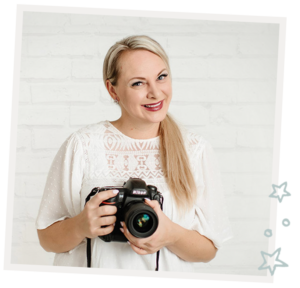
I'm
Lisa DiGeso
I’m on a mission to create uplifting online experiences for photographers ready to elevate their art, their business and their mindset.(...and have fun along the way!)















